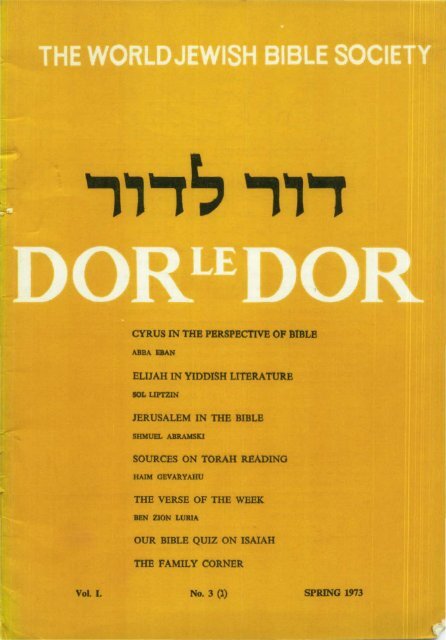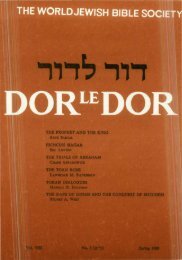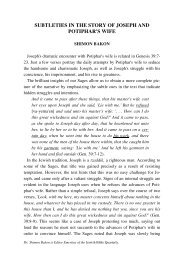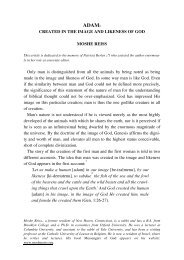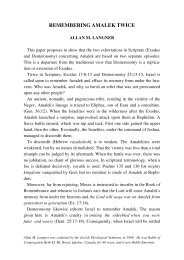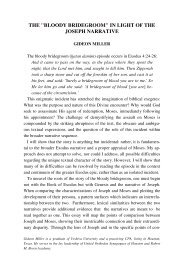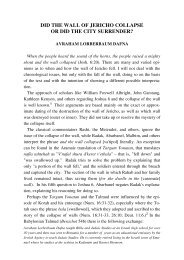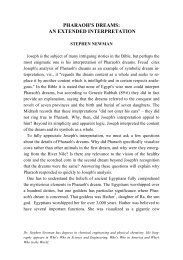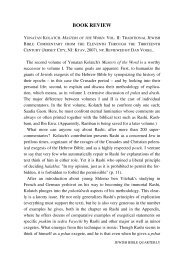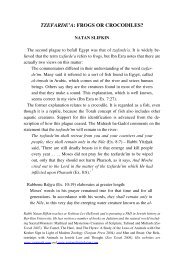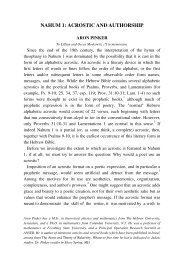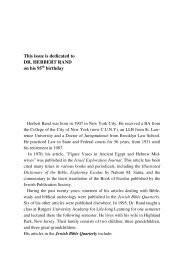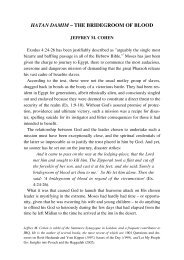ELUAH IN YIDDISH LITERATURE - Jewish Bible Quarterly
ELUAH IN YIDDISH LITERATURE - Jewish Bible Quarterly
ELUAH IN YIDDISH LITERATURE - Jewish Bible Quarterly
Create successful ePaper yourself
Turn your PDF publications into a flip-book with our unique Google optimized e-Paper software.
Vol. I.<br />
CYRUS <strong>IN</strong> THB PBRSPBCfiVB OP BIBLB<br />
ABBA EBAN<br />
<strong>ELUAH</strong> <strong>IN</strong> <strong>YIDDISH</strong> <strong>LITERATURE</strong><br />
SOL LIPTZ<strong>IN</strong><br />
JERUSALEM <strong>IN</strong> THE BmLB<br />
SHMUEL ABRAMSKI<br />
SOURCES ON TORAH READ<strong>IN</strong>G<br />
HAIM OBV AllY AHU<br />
THE VERSE OF THE WEEK<br />
BBN ZION LURIA<br />
OUR BIBLE QUIZ ON ISAIAH<br />
TilE FAMILY CORNER<br />
No.3 (l) SPR<strong>IN</strong>G 1973
THE PROCLAMATION<br />
The rescript of Cyrus is given in full in the first chapter of Ezra, and in<br />
abridgement in II Chronicles (36:22-3). The Book of Ezra opens thus:<br />
Now in the first year of Cyrus, king of Persia, that the word<br />
of the Lord by the mouth of Jeremiah might be fulfilled, the<br />
Lord stirred up the spirit of Cyrus, King of Persia, that he<br />
proclaimed throughout all his kingdom, and put it also in<br />
writing, saying: Thus saith Cyrus, King of Persia, The Lord<br />
God of heaven hath given me all the kingdoms of the earth;<br />
and he has charged me to build him a house in Jerusalem,<br />
which is in Judah. Who is there among you of all his people,<br />
his God be with him, and let him go up to Jerusalem, which is<br />
. in Judah, and build the house of the Lord of Israel, (he is the<br />
. God), which is in Jerusalem. And whosoever remaineth, in<br />
any place where he sojourneth, let the men of his place help<br />
him with silver, and with gold, and with goods, and with beasts,<br />
beside the freewill offering for the house of God that is in<br />
Jerusalem. Then rose up the chief of the fathers of Judah and<br />
Benjamin, and the priests, and the Levites, with all them<br />
whose spirit God had raised, to go up to build the house of the<br />
Lord which is in Jerusalem. And all they that were about them<br />
strengthened their hands with vessels of silver, with gold, with<br />
goods, and with beasts, and with precious things, beside all<br />
that was willingly offered (Ezra, 1 :1-6).<br />
CYRUS, THE MAN AND IDS MOTIVES<br />
Let us pause and study the character of Cyrus and the promptings of his<br />
proclamation to the Jews of Babylonia. It was no hyperbole for him to be<br />
vainglorious: 'The Lord, the God of heaven hath given me all kingdoms of the<br />
earth'. In the space of eleven years, he rose from the satrapy of an exiguous<br />
region -Anshan in the territory of Elam- to be king of an empire stretching<br />
from the Indus River to the Mediterranean, from the Caucasus to the Indian<br />
Ocean. He instituted laws and traditions in that vast domain that stood the<br />
test of time for two hundred years. In expanse, his realm was larger than that<br />
of Alexander of Macedon.<br />
But his singularity found its conspicuous expression in his attitude towards<br />
his subject peoples, among them a hundred and fifty thousand Jews in Babylonia.<br />
Here, we must be careful to observe that Cyrus did not favour regional<br />
autonomy. His tolerance, wide as it was, was articulated only in the sphere of<br />
3
eligion. He was in no wise moved by any particular relationship to J udaisrri<br />
or by any exceptional understanding of it. It was simply that he took no steps<br />
to convert any of his conquered folk to Persian culture and eschewed anything<br />
resembling· the process of Hellenization which Alexander pursued. Nor did<br />
he suppress any diversity of religions, as did many before him and after him.<br />
His proclamation, as recorded in the Book of Ezra, concerns the house of God<br />
in Jerusalem, nothing more. There is no indication that he knew of the utter<br />
destruction of Jerusalem. It might well be that Jews of Babylonia kept that<br />
intelligence from him, for it might not redound to the honour and prestige of<br />
their faith.<br />
The prophets of Israel ascribed a further distinction to Cyrus, that of a<br />
benevolent Gentile who recognized the quintessential purity of Judaism and its<br />
sublimity of vision, in contrast ·to other creeds. Verily, Cyrus speaks of the<br />
God oflsrael as the God of heaven, that is to say, as a God who cannot be<br />
identified with stick or stone, with any image graven or molten. Still, he<br />
himself clung to his own god Marduk, to whom he pours out his soul in words<br />
preserved for posterity on a Babylonian cylinder. The licence granted to the<br />
Jews to build their house was not a departure from his national policy, nor<br />
did it attest any particular nexus. That love of the <strong>Bible</strong> with which Balfour<br />
and Lloyd George were animated had no part in the thinking of Cyrus.<br />
AN OPPORTUNITY - NoT A Gwr<br />
The significance of this historic opportunity is, however, underscored by the<br />
impetus toward self-realization that it imparted, rather than by the intentions<br />
of the king. The epistle of Cyrus descended like a thunderclap upon Babylonian<br />
Jewry, which was torn between the blandishments of assimilation and the<br />
instinct of national survival. The Jews who were banished to Babylonia after<br />
the destruction of the First Temple found themselves immersed in a highly<br />
developed and radiant culture. Stunned by the first shock of exile, they sat,<br />
yea, they wept when they remembered Zion. They still set Jerusalem above<br />
their chiefest joy. "How shall we sing the Lord's song in a foreign land?" But,<br />
as the days went by, they looked about • them and beheld the splendour of<br />
Babylonia, its towers and palaces, and its bustling commerce. The inexorable<br />
laws of history were thrusting them towards absolute national disintegration.<br />
Even so, as many were steeped in the spirit of Cyrus - and since, luckily,<br />
the twelve volumes of Toynbee showing how cultures are born, flourish and<br />
die did not come their way! - the Jews, paradoxically on the foreign soil of<br />
Babylonia, evolved forms of faith and divine worship which saved them from<br />
extinction and vouchsafed their descendants a spell of renewed life. Prayers in<br />
the synagogue took the place of Temple sacrifice. Religion discarded its
external cultic fonris and developed a system. of symbols for pious thought.<br />
Prophecy became dominant as the priesthood withdrew. By detaching Judaism<br />
from a dependence upon the accidents of time and place, the Jews of Babylonia<br />
transformed it, made it mobile, and so minimized its vulnerability. There was,<br />
of course, still the danger that the faith of Israel might be sundered from its<br />
fount. But, here, the charter of Cyrus made it possible to link the spiritual<br />
renaissance with the land of its birth.<br />
It is easy, therefore, to understand the exuberance of the prophets who, in<br />
lauding the event, stretched their esteem of the king to the point of adulation.<br />
Thus saith the Lord to His anointed,<br />
To Cyrus whose right hand I have holden,<br />
To subdue nations before him;<br />
And I will loose the loins of kings,<br />
To open before him the two leaved gates;<br />
And the gates shall not be shut;<br />
Isaiah 45 :I<br />
That saith of Cyrus, He is my shepherd,<br />
And shall perform all my pleasure:<br />
Even saying to Jerusalem, Thou shalt be built;<br />
And to the temple, Thy foundation shall be laid.<br />
Isaiah 44:28<br />
No other foreign potentate won such paeans from the prophets of Israel. One<br />
might, indeed, bring proof that the intention of the king of Persia did not merit<br />
such praises. For, in bitter effect, the homecoming exiles were met by thorny<br />
obstacles which his emissaries and officers placed in their path, so much so<br />
that, more than once, the building of the new Temple was brought to a standstill.<br />
But two of the hopes raised high by the prophets were truly fulfilled. It<br />
was Cyrus who undid the shackles of Judaism in an alien environment. As it is<br />
written, 'That thou mayest say to the prisoners, Go forth; to them that are in<br />
darkness, Shew yourselves' (Isaiah 49:9). It was he, too, that made possible<br />
the establishment of the Second <strong>Jewish</strong> Commonwealth.<br />
When we come to gauge the consequences of those acts of his for all succeeding<br />
generations of Israel, it seems to me that the enthusiasm of the prophets<br />
was more justified than the somewhat uncharitable estimate of rabbinic Sages.<br />
Not that there are not commentators who record the magnanimity of Cyrus.<br />
Rashi, in tractate Rosh Hashana, concludes that Cyrus was a righteous king<br />
and therefore was properly called worthy. So also Ibn Ezra. On the other hand,<br />
5
a Midrash says: The community of Israel said to the Master of the world,<br />
"Why were miracles wrought by the hands of Cyrus; would it not have been<br />
better had they been brought about by Daniel or another righteous man?"<br />
The version there presented Cyrus as ambivalent: those who left Babylonia<br />
he allowed to abide in Jerusalem, but the call went forth to let no others go.<br />
So it is that the Sages held variant opinions about him: one interprets the<br />
verse, "The voice of the turtle is heard in our land" (Song of Songs, 2:12), as<br />
referring to the Messiah, son of David; another holds the verse to refer to<br />
Cyrus.<br />
Cyrus was not the anointed of God, and his posture towards the Jews was<br />
not notably cordial. He was a great soldier and a great king who built an<br />
empire, the like of which, till his days, had never been known. There were<br />
many peoples in his kingdom to which he granted freedom of worship without<br />
trying to fashion them into one family. When he died, most of them put a seal<br />
of silence on his memory; they were no longer beholden to him. Two literary<br />
nations of the ancient world, the Jews and the Greeks, did cherish his memory<br />
and kept it alive. In Greek literature, his might and grandeur are recounted.<br />
In ours, his name is linked with a freedom and rebirth which in no small<br />
measure influenced the spiritual and cultural evolution not only of Israel but<br />
of all nations.<br />
It is natural that remembrance of him should be evoked this year by his<br />
people, through the Shah of Iran, as symbol of the glory of former Persia,<br />
and in homage to it. There is good reason for representatives of nations to<br />
gather and recall epochs of greatness and productivity. I do not share the<br />
views of critics and detractors of celebrations of that kind. But, in essence, in<br />
antiquity and no less today, the outcome of Cyrus' historic action was registered<br />
only in Jerusalem, where his successor, Darius the Second, decreed to the<br />
Jews, saying, 'That they may offer sacrifices of sweet savour unto the God of<br />
heaven, and pray for the life of the king, and of his sons' (Ezra, 6:10).<br />
6
ELIJAH AND THE <strong>YIDDISH</strong> CLASSICAL TRIUMVIRATE<br />
The earliest of the Yiddish classical triumvirate, Mendele Mocher Sforim,<br />
reproduced in Yiddish verses the chants sung at the close of the Sabbath about<br />
Elijah the Seer, Elijah the Tishbite, Elijah the Giladite, Elijah the Herald of<br />
Messiah.<br />
Sholom Aleichem composed a phantastic story of Elijah for Jew1sh children<br />
but intentionally left it incomplete so as to stimulate their creative imagination.<br />
His Elijah, an old man with a wrinkled face, a long beard, soft, kind eyes, and<br />
carrying a sack on his shoulders, offers to a child that failed to stay awake io<br />
the end of the Sedar evening a choice of being carried off in the sack or else<br />
of remaining asleep for ever and ever. Leaning on h1s staff, Elijah waits for the<br />
boy to make up his mind - or is there still another alternative as yet unexplored<br />
1 The solution of the riddle posed by Sholom Aleichem is left to his<br />
young readers.<br />
More frequently than Mendele or Sholom Aleichem was Peretz fascinated<br />
by the legendary figure of Elijah. In the beautiful, romantic novelette, Mesiras<br />
Nefesh, he introduced Elijah as the teacher of Torah to a poor, homeless<br />
orphan, who Jived alone in the desert and nourished himself on herbs. The<br />
young man could not look at his teacher save from a distance, because the<br />
latter's eyes glistened in the dark like stars and his white beard was radiant<br />
like pure snow. Peretz also has Elijah pave the way for the redemption of the<br />
central character in the narrative, the repentant sinner Hananya.<br />
In Peretz's tale, The Magician, Elijah is introduced as the savior of the<br />
be ieving _couple Chaim-Yone and Rivke-Beele, conjuring up for them an<br />
unexpected Sedar-feast, when they are unable to provide it for themselves.<br />
They are deemed worthy of his extraordinary assistance because in adversity<br />
they still retained faith in the fundamental justice that must prevail in heaven<br />
and on earth, in the realm of God and in the destiny of man.<br />
In a tale written for children, Peretz lets the kind-hearted, white-bearded<br />
wanderer Elijah come into a home to rest for a while. He puts down his bundle,<br />
which i> filled with raisins, almonds and other sweets, and he talks about the<br />
rewards available to children who behave properly.<br />
In Peretz's most popular Elijah-story, Seven Years of Plenty, he has Elijah<br />
offer the porter Tevye seven good years. These can be taken immediately, but<br />
thereafter Tevye would revert to his poor condition, or else these years can be<br />
allotted to him at the end of his life and then he would leave this world as a<br />
wealthy person. Tevye and his wife prefer to accept the proferred riches immediately,<br />
so that they can pay the tuition-fee for their children to learn Torah.<br />
When Elijah reappears seven years later and learns that the pious couple have<br />
8
not used the wealth entrusted to them for any other purpose, he feels that they<br />
deserve to retain it until the end of their days.<br />
ELIJAH <strong>IN</strong> <strong>YIDDISH</strong> DRAMA<br />
In a one-act play by Peretz Hirshbein, Elijah is shown not only in the role of a<br />
bestower of bounties upon the worthy but also as one who takes back his<br />
benefactions, if the recipients prove unworthy. When Elijah comes as a Sabbathguest<br />
to a poor villager and is received with great hospitality, then the winebottle<br />
he left his host after Havdala continues to pour out wine into glasses<br />
and casks, the cow of the villager continues to give milk unceasingly, and the<br />
sack which the guest seemingly forgot continues to dispense gold coins until<br />
all unfilled vessels ;n the household are filled to the brim. However, when<br />
greediness takes possession of the family and Elijah's gift of Havdala-wine is<br />
poured out from the casks in order to provide additional containers for gold<br />
pieces, then the sack ceases to be a magic purse and the heaped-up gold turns to<br />
dross. In pouring away God's wine, the family has poured away God's grace.<br />
In H. Leivick's messianic dramas from his earliest The Chains of Messiah,<br />
written in 1908 during his imprisonment in Minsk for revolutionary agitation,<br />
to his better known The Go/em, written under the impact of the Russian<br />
Revolution of 1917, and the Comedy of Salvation, a sequel to The Go/em,<br />
composed between 1930 and 1932, the Yiddish dramatist assigns to Elijah an<br />
important role as the forerunner of Messiah. In the first play, when the angel<br />
Azriel rebels against God's command to chain the Messiah until the distant<br />
era of redemption and rather prefers to forfeit the bliss of all the seven heavens<br />
for the deeper experience of sharing in the woe of earth and of man, Elijah,<br />
who once ascended to heaven on a chariot of fire, joins him in descending again<br />
to earth. He too is prepared to wander on all roads through generations of<br />
pain, to work for the liberation of the Messiah from chains, and to comfort<br />
mail with the assurance of glorious salvation, as soon as the human heart<br />
will be cleansed of evil.<br />
In The Go/em, Leivick, who could not reconcile himself to the cost in blood<br />
and cruelty brought about by the revolutionary Golem, has the true Messiah<br />
appear as a young beggar in the company of Elijah, an old beggar. Both roam<br />
about unheeded and, when finally recognized by the Maharal, are chased away<br />
by him. For, their age has not yet dawned, their love is still unwanted and<br />
undeserved, human hearts are not yet purged of evil, suffering has not yet<br />
reached sufficient magnitude to renovate the human spirit.<br />
Leivick's Comedy of Salvation takes place in the remote future and concentrates<br />
on the final struggles between Gog, Magog, the blood-stained, powerhungry,<br />
unholy Messiah of the House of Joseph and the pure-hearted, love-<br />
J
In the lyric "Eliahu Hanavi" by Naftoli Gross, children look out in holiday<br />
joy from rooms radiating dazzling light and seated at tables bedecked with<br />
golden wine-cups. They hope that the kindhearted prophet will not forget to<br />
enter their home.<br />
The Los Angeles poet H. Rosenblatt, in his poetic volume Herodes (1930),<br />
recreates the images, figures and episodes that remained in his memory from<br />
his earliest years in a Podolian village. Among these memories, Elijah looms<br />
prominently as a whitebearded figure, with eyes like stars and a face yellow<br />
like the tallow of Yom Kippur candles. Yet this Elijah could perform all the<br />
pranks and deeds that the poet, in his childhood, would have wanted to do but<br />
could not.<br />
Kadia Molodowsky, in a poetic tale for children, tells of a poor man who<br />
encounters the disguised Elijah on the road and asks him if both may not<br />
wander on together. Elijah agrees on condition that his companion ask no<br />
questions, no matter what they may see or hear. During the first night, they<br />
are granted hospitality at the home of a poor widow. After they leave, Elijah<br />
prays that the only goat of the widow die. During the second night, they seek<br />
lodging at a rich man's home and are turned away. When the bouse burns<br />
down, Elijah pra)s that the wicked owner might never lack bread. In the<br />
presence of such apparent unfairness, Elijah's companion can no longer hold<br />
his tongue. Elijah then justifies his behavior. Heaven bad decreed an early<br />
death for the widow and therefore he prayed that God might accept the death<br />
of the goat and let her live on to a prosperous old age. As for the wicked man,<br />
Elijah had prayed that he be provided with bread so as not to resort to robbery.<br />
The delightful charm of Kadia Molodowsky's early tale gives way to cries<br />
of anguish in a poetic epistle addressed to Elijah in 1942, when her kinsmen in<br />
the ghettos were suffering under Nazi oppression. She asks the prophet of<br />
vengeance and mercy for news of what was happening behind the wicked walls<br />
in the land of her people's pain. A second grim poem of the same year depicts<br />
a Seder night in which the table has been set for twelve but all twelve Jews have<br />
perished. Only Elijah's cup shows a diminution of wine, while all other cups<br />
remain full. Will be now answer the annual call to pour out his wrath upon the<br />
oppressors? Will he at last bring comfort to the remnants of his people?<br />
Mani Leib's ballad "The Stranger" resembles Kadia Molodowsky's folktale.<br />
Elijah, the ragged stranger, is refused entry at a rich man's palace on a<br />
cold, dark night, but is given shelter in a poor man's hovel beside the unlit<br />
stove. When he leaves before dawn, the stove warms, a lamp burns brightly,<br />
the table is laden with rich food, while in the cold palace servants scurry around<br />
in search of a missing lamp.<br />
11
Mani-Leib also versifies four other tales about Elijah. In one story, Elijah<br />
strolls through the forest disguised as a peasant, in another he feeds the<br />
pigeons of the market place, in a third he hires himself out as a servant,<br />
with the money for his hire going to a poor Jew who has already pawned<br />
everything of value but not tallit and tfillin. In the fourth story, Elijah sits as<br />
an unrecognized beggar in a Beth Hamidrash, warming his cold feet at an old<br />
stove. Suddenly he hears the wind bring from afar the moaning of a woman in<br />
childbirth. He goes out into the snow and storm and awakens the woman's<br />
neighbors from their sleep. When they come to help her, he returns to join the<br />
Jews in the Beth Hamidrash who are still bent over their old, yellowed tractates.<br />
Two ballads of Itzik Manger center about Elijah. In one, the prophet is<br />
presented as an old beggar whose fiddle dispels the fear of pogroms and lulls<br />
poor children to happy slumber. In another, Elijah redeems from the pawnshop<br />
the silken dress of the poet's mother, so that she can wear it at her daughter's<br />
wedding; as Reb Eliahu Hanavi, he then joins the wedding guests in dancing<br />
and merrymaking.<br />
The aging Montreal poet J.l. Segal in late lyrics, Yehoash in the fable<br />
"Elijah and the Dogs," Alef Katz in his post-Holocaust verse playlet Good<br />
Moming, A/ef, Chaim Grade in a cycle of twenty poems, and other Yiddish<br />
men-of-letters find ever new variations on the Elijah theme.<br />
CONCLUSION<br />
Yiddish writers have a more intimate relationshtp to Elijah than to any other<br />
prophet. They are able to project through him their own sorrows, their own<br />
demands for justice, their own longing for salvation. Time does not tarnish<br />
his radiant personality nor do his b•ggardly disguises and his humble behavior<br />
diminish him. He has become the symbol of patience and endurance far more<br />
than of fanatical heroism. He exemplifies for the individual Jew, and especially<br />
for the <strong>Jewish</strong> child to whom many Elijah poems, plays and narratives are<br />
directed, the ideal of moral man, good and kind, righting wrongs, comforting<br />
with helpful deeds, and ever holding out hope of better days to come, indeed<br />
of a Messianic age when evil and strife shall cease and universal love and peace<br />
shall embrace all things living.<br />
12
(Joshua 10:1). In the process of time, however, this name came to symbolize<br />
the character of the city: the city of righteousness, the dwelling-place of righteousness,<br />
"righteousness lodged in her" (Isaiah I :21).<br />
"PHARAOH" <strong>IN</strong> JERUSALEM<br />
In the 14th century B.C.E., the city is mentioned in the el-Amarna tablets,<br />
which include six letters from the ruler of Jerusalem to his master Pharaoh,<br />
King of Egypt. The ruler is called Abd-Hpa or Puti-Hapa. This ruler of Jerusalem<br />
was loyal to Pharaoh, at least so he swears in every manner possible, and<br />
because of this loyalty, he suffered at the hands of the "Habiru" (who were<br />
close to the Hebrew), the enemies of Egypt, whom he regards as invaders. The<br />
other Canaanite kings harassed him too, among them the Kings of Shechem<br />
and Gezer. He calls himself "the officer of the King" (of Egypt), and asks<br />
Pharoah for military assistance against the common enemy.<br />
Abd-Hpa reminds him: "Behold, my king has caused his name to dwell in<br />
Jerusalem forever." It may well be that this was a fixed term of Pharaoh's<br />
kingdom, and that Jerusalem was important to the Pharaohs who had preceded<br />
Akhnaton in the period of el-Amarna; yet the King of Egypt, apparently, was<br />
not sufficiently alarmed to rally to the city's protection. The historian cannot<br />
fail to read this letter of Abd-Hpa with irony, for he says that Pharaoh has<br />
caused his name to rest in Jerusalem "forever". We know, however, that<br />
Pharaoh's sovereignty over Jerusalem was of short duration, weak, and without<br />
great ;nfluence on the history or cultural development of the city. But this<br />
motif of the setting of monarchy in Jerusalem "forever" clung to the city from<br />
the period of Pharaoh nntil "the branch stemming from the trunk of Jesse".<br />
David, son of Jesse, was still consolidating his monarchy in Jerusalem when<br />
the prophet Nathan promised him everlasting kingship in Zion. "And thy<br />
house and thy kingdom shall be made sure for ever before thee; thy throne<br />
shall be established forever" (II Samuel 7: 17).<br />
JOSHUA'S BATTLE<br />
On the evo of the Israelite conquest, Jerusalem again enjoyed the reputation<br />
of being the focal point of the country, as it had for hundreds of years prior to<br />
this, from the beginning of the second millenium. When Joshua came to subdue<br />
the country, Adonizedek, King of Jerusalem, headed the federation of the<br />
Amorite Kings against Israel (Josh. 10). Although Joshua vanquished the<br />
Amorite Kings, and smote the King of Jerusalem, there is no mention of the<br />
city being captured at that time.<br />
The Book of Judges relates, that the tribe of Judah waged war against<br />
Jerusalem after the death of Joshua, smiting the inhabitants and setting fire to<br />
14<br />
-
•<br />
-<br />
the city (Judg. 18 :8). This would lead us to infer that the city which was not<br />
conquered by Joshua was subsequently destroyed by the tribe of Judah. This,<br />
however, was only a raid and Jerusalem was again populated by a foreign<br />
population - the Jebusites.<br />
A JEBUSITE CITY<br />
Judges I :21 tells us: "The children of Benjamin did not drive·"out the<br />
Jebusites that inhabited Jerusalem; but the Jebusites dwelt with the 'Children<br />
of Benjamin in Jerusalem to this day". The Jebusites actually dwelt on the<br />
border of Judah, hence we are told in Joshua 15:63: "And as for the Jebusites,<br />
the inhabitants of Jerusalem, the children of Judah could not drive them out;<br />
but the Jebusites dwelt with the children of Judah at Jerusalem unto tbis day".<br />
The Jebusites ruled Jerusalem until the days of King David, namely, for<br />
more than 200 years after Canaan was conquered by the Israelites. It seems<br />
that Jerusalem had a mixed population. The origin of the Jebusites is unknown,<br />
but some say that they were a Hittite people. Be that as it may, the<br />
city was named for them (Judges 19:10; I Chronicles 11 :4). In the time of<br />
David, when Jerusalem became part of the Kingdom of Israel, it regained its<br />
natural, geographical importance as the chief crossroads of the highways<br />
between the various parts of the mountains, between the mountains and the<br />
Shephelah, and between the Jordan Valley and the Judean Mountains.<br />
JERUSALEM- SURROUNDED BY VALLEYS<br />
Archaeological evidence is a great aid in understanding biblical Jerusalem.<br />
As far back as the Early Stone Age men lived in the vicinity of Jerusalem, as is<br />
evidenced by tbe many flint vessols unearthed in Emek Rephaim (the German<br />
Colony). The first permanent settlement of the city was, it seems, in the Early<br />
Bronze Age (3rd millenium B.C.E.). The settlement was on the eastern hill of<br />
what we now call the Old City, near the only spring in the area of Jerusalem,<br />
namely, the Gihon spring, which flows on the eastern slope of this hill. The<br />
main settlement in the third and second millenium B.C.E. was on the southern<br />
edge of the hill, which was surrounded by valleys on three sides: on the west, by<br />
the central valley, called Tiropaen in a later period; in the east by the Vale of<br />
Kidron, and in the south by the Vale of Ben Hinnom.<br />
Although Jerusalem is described in Psalms 128:2 as a city surrounded by<br />
hills, they did not serve as natural fortifications because of their open entrances.<br />
The valleys between the mountains and the settlement stopped the enemy from<br />
attacking the city. The weakest point was in the north where there was no<br />
protective valley; and it was here that the main fortifications were erected over<br />
the ages.<br />
15
•<br />
inhabitants of the land who spoke unto David, saying: 'Except thou take away<br />
the blind and the lame, thou shalt not come in hither; thinking: 'David cannot<br />
come in hither' " (II Sam. 5 :6).<br />
It is difficult to fathom the precise intention of this verse. Was the Jebusite<br />
king mocking David, saying that even if he placed the lame and the blind on the<br />
wall David would not be able to prevail against them? Or, perhaps basing<br />
conjecture on Hittite sources, we might say, "the blind and the lame" was the<br />
name given ironically to divisions of his army to describe their special characteristics.<br />
They were select troops who took an oath of loyalty to their king<br />
swearing by the light of their eyes and their ability to march, as a sign of their<br />
faithfulness to him. Should this conjecture be true, David was faced by select<br />
troops, who cast dread on his soldiers. One thing was clear, David was faced<br />
by very strong opposition, being warned "thou shalt not come in hither," and<br />
"David cannot come in hither."<br />
David bade his soldiers to smite the enemy with deeds of heroism: "And<br />
David said on that day: Whosoever smiteth the Jebusites, and getteth up to the<br />
gutter, and (taketh away) the lame and the blind, that are hated of David's<br />
soul" (II Sam. 5 :8). In I Chronicles 11 :6, we read a more detailed description:<br />
"And David said: Whosoever smiteth the Jebusites first, shall be chief and<br />
captain." And Joab, the son of Zeruiab, went up first and was made chief.<br />
If we combine these two sources, it becomes clear that David was faced with<br />
an unusual kind of war which demanded the heroic exploits of individuals. It<br />
seems logical but not certain that David's army, led by Joab, the son of Zeruiah,<br />
broke into Jerusalem by way of the tunnel, capturing the water-source, and,<br />
reaching the upper town, surprised the Jebusites, and conquered the fortress.<br />
This may well be the explanation of "and be reached the gutter," that is, the<br />
water gutter.<br />
"And David took the stronghold of Zion; the same is the city of David"<br />
(II Sam. 5 :7).<br />
To be continued<br />
TWENTY FIRST NATIONAL BIBLE STUDY CONFERENCE<br />
The twenty first national <strong>Bible</strong> study conference of the Israel Society for Biblical<br />
Research will be held in Jerusalem from April 8-JJ. The books to be studied this year<br />
are Psalms and Ruth. About forty Biblical scholars will participate. Since its inception 9<br />
the Society has completed the intensive study of the Tenakh and is presently in its<br />
second cycle.<br />
17
OuR VERSE AND ARCHEOLOGY<br />
One of the most exciting archeological digs presently in operation is the one<br />
near the Western Wall, carried on under the direction of the renowned archeologist<br />
and former president of the Hebrew University, Professor Benjamin<br />
Mazar. Our verse was surprisingly found inscribed on one oftbe stones of the<br />
wall (see photograph).<br />
The inscription was uncovered much below our present ground level. It was<br />
discovered as the archeologists were digging under "Robinson's Arch" and<br />
reached the street of the Byzantine period. (Robinson's Arch can easily be<br />
seen from the western approach to the Kotel, near the entrance booth to the<br />
square. If you cannot find the protrusion in the wall, ask any Israeli and he<br />
wiJJ point it out to you. The story and explanation of the arch are most inter-<br />
And when you see this, your heart will rejoice and "their bone" shall (flourish)<br />
like young grass.<br />
esting, but it would take us too far afield to go into this phase in our present<br />
context - perhaps some other time.)<br />
According to the scholars, the verse was chiseled into the stone during the<br />
reign of the Roman Emperor Julian (called Julian the Apostate in our general<br />
history books) who aroused great jubilation among the Jews when, in the<br />
year 362, he permitted them to build anew the Bet Hamikdash, destroyed by the<br />
Romans three centuries earlier. No wonder that the Jews of that period called<br />
upon this comforting verse in Isaiah in that one brief moment of hope and joy,<br />
and carved it into the only and most sacred remnant of the Temple, the<br />
Western Wall.<br />
uAs one whom his mother comforteth,<br />
So wiJJ I comfort you;<br />
And you shall be comforted in Jerusalem.<br />
And when you see this, your heart shall rejoice,<br />
And your bones shall flourish like grass. Isaiah 66:12-14<br />
The verse is the silent testimony of over a miJJenium and a half of continued<br />
exile but also of unquenchable hope for redemption, only now realized.<br />
25
I will drive them out My house;<br />
I will love them no more,<br />
All their princes are rebellious.<br />
Hosea 9:14-15<br />
COMFORT<br />
I will heal their backsliding<br />
I will love them freely;<br />
For Mine anger is turned away from him<br />
I will be as the dew unto Israel;<br />
He shall blossom as the lily,<br />
And cast forth his roots as Lebanon.<br />
His branches shall spread,<br />
And his fragrance as Lebanon.<br />
Hosea 14:5-7<br />
AMOS<br />
ADMONITION<br />
Hear this word, ye kine of Bashan,<br />
That are in the mountains of Samaria,<br />
That oppress the poor, that crush the needy,<br />
That say to their lords, "Bring that we may feast."<br />
The Lord God hath sworn by His holiness:<br />
Lo, surely the days shall come upon you,<br />
That ye shall be taken away with hooks,<br />
And your residue with fish-hooks.<br />
Amos 4;1-2<br />
COMFORT<br />
Behold, and I will turn the captivity of my people Israel,<br />
And they shall build the waste cities and inhabit them;<br />
And they shall plant vineyards, and drink the wine thereof;<br />
And I will plant them upon their land,<br />
And they shall no more be plucked up<br />
Out of their land which I have given them,<br />
Saith the Lord thy God.<br />
Amos 9:14-15<br />
MICAH<br />
ADMONITION<br />
Hear, I pray you, ye heads of Jacob,<br />
And rulers of the house of Israel:<br />
Is it not for you to know justice?<br />
27
THE YOUTH CORNER<br />
OUR BIBLE QUIZ<br />
From April through June those following the Triennial <strong>Bible</strong> Calendar will<br />
be studying the Book of Isaiah. The following questions are taken from a recent<br />
World Youth <strong>Bible</strong> Contest. Only those referring to the Book of Isaiah were<br />
culled. That should make it a little easier for non-experts. If you can score more<br />
than 12 correct answers you're probably an Isaiah Scholar.<br />
Check your answers on page 37.<br />
I. Who will "not judge by what his eyes see?"<br />
2. In what instance did figs serve as medicine?<br />
3. What is the source of the expression, "four corners of the earth?"<br />
4. About whom is it stated that "the spirit ofthe Lord shall rest upon him,<br />
the spirit of wisdom and understanding?"<br />
5. Which king was promised treasures of darkness?<br />
6. The prophet loved Jerusalem. In the latter part of the Book of Isaiah the<br />
city is referred to with great reverence. Give two terms for the city.<br />
7. Who will wear garments of righteousness (j'1ll) and faithfulness (:ll11lN)?<br />
8. According to Isaiah, where will the nations flow?<br />
9. Who will act as shepherd to beasts?<br />
10. The Israelites left Egypt hurriedly. From which country did the prophet<br />
predict a slow exodus?<br />
II. Who is drunk but not from drink?<br />
12. The prophet describes Zion-Redeemed as being covered with. . . . . .<br />
13. Who covered themselves with sacks (to symbolize mourning)?<br />
14. Whom does the prophet refer to in the same verses as both a cloud and<br />
doves?<br />
15. Who received a double measure from God?<br />
16. Which two persons from the Torah does the prophet cite as a sign of Zion's<br />
deliverance?<br />
17. A king will generously labor without charge or reward. Who is he and<br />
what will he do?<br />
18. It is predicted that foreigners will do Israel a great service. What work will<br />
they perform?<br />
29
HUQQAT July 7, 1973<br />
The Torah (J.P.S.), pp. 283-289 Hertz Edition: pp. 652-664<br />
I. How long were the Israelites in the desert after the exodus from Egypt?<br />
2. What are some of the events that took place at the end of their sojourn<br />
in the desert ?<br />
3. Of the entire generation of the desert, only two people were privileged to<br />
enter the Promised Land. They were Joshua and Caleb, about whom we<br />
read in the Sidra of Shelah (Numbers 14:38). Why didn't Moses enter<br />
the Promised Land?<br />
4. Of the two brothers and sister, we read about the death of Aaron (20:22-29)<br />
and of Miriam (20: 1-2) in this Sidra. In what Sidra do we read about the<br />
death of Moses?<br />
5. According to <strong>Jewish</strong> legend, the Israelites had water to drink during thirtyeight<br />
years of their sojourn in the desert because a spring accomP,anied<br />
them all this time in merit of Miriam. How did this legend originate?<br />
BALAQ<br />
The Torah (J.P.S.), pp. 289-297<br />
July 14, 1973<br />
Hertz Edition: pp. 669-682<br />
I. Balaq, king of Moab, was afraid of the Israelites because of their conquests,<br />
and so he invited Balaam, a famous soothsayer, to curse them. Balaam<br />
hesitated. Why, do you think, was Balaam in doubt whether to go?<br />
2. Did Balaam inwardly really want to accept Balaq's invitation to curse the<br />
Israelites? How do we know?<br />
3. How did Balaq win him over?<br />
4. But if God held him back, how could he decide to go?<br />
5. Balaam hastened to go. But before he arrived at his destination, he had<br />
some trouble with his donkey. What is the story about Salaam's donkey?<br />
P<strong>IN</strong>EHAS<br />
The Torah (J.P.S.), pp. 297-307<br />
July 21, 1973<br />
Hertz Edition: pp. 686-698<br />
I. In this Sidra all of the major holidays are mentioned. How many can you<br />
remember?<br />
2. What are the four major festivals?<br />
3. To which of the four festivals mentioned above does the holiday of<br />
Simchat Torah belong?<br />
4. What are the two High Holydays mentioned in this chapter?<br />
5. Are they called by these names?<br />
32
MAITOT-MAS'E<br />
The Torah (J.P.S.), pp. 307-313<br />
July 28, 1973<br />
Hertz Edition: pp. 702-710<br />
I. How do we know from the <strong>Bible</strong> that a person must keep his promises?<br />
2. What is a vow?<br />
3. Is a child held liable for promises he cannot keep?<br />
4. At a certain age in the girl's life, the father has the right to veto the pledges<br />
or vows taken by the daughter, provided he does so on the day of the<br />
vow. At what age does this law apply?<br />
5. This is the last Sidra of the Book of Bemidbar. Can you repeat the Sidrot<br />
of this book?<br />
ANSWERS TO THE BOOK OF BEMIDBAR<br />
BEMIDBAR<br />
I. The Hebrew name is taken from one of the first words at the beginning of<br />
the book. "Bemidbar" is the fourth word in the opening verse. The<br />
English name comes from the Septuagint (Greek translation of the<br />
<strong>Bible</strong> by the seventy scribes) which bases the names of the books on the<br />
basic content contained therein. Thus, our book is called Numbers since<br />
the first important item is the taking of the census.<br />
2. The tribe of Levi.<br />
3. a) They were to have their own specific census (see ch. 3).<br />
b) They did not receive a portion of the land of Canaan in the time of<br />
Joshua.<br />
c) Instead, they were assigned certain cities.<br />
d) They were dedicated to the service of the Sanctuary.<br />
4. In early antiquity, the priestly privileges and functions belonged to the<br />
"behor" or first born. When the Israelites fashioned the Golden Calf,<br />
the first-born participated in that idolatrous worship. The tribe of Levi,<br />
on the other hand, stood fast in their faith during that crisis and were<br />
given the distinction of becoming the Kohanim and Levites serving the<br />
Sanctuary.<br />
5. a) Today, the Kohen and Levite are afforded the special privilege of<br />
being called to the Torah for an aliyah before the Israelite.<br />
b) The first born (bechor) of a family of a Kohen or a Levite is exempt<br />
from a "Pidyon Raben", the ceremony of the redemption of the first<br />
born, observed a month after birth.<br />
33
ANSWERS<br />
NASO<br />
I. a) In Israel, you can hear it each morning in the synagogue as the blessing<br />
of the Kohanim near the conclusion of the review of the Shemone Esre.<br />
b) In American Orthodox synagogues, as the blessing of the Kohanim at<br />
the end of the Musaf Shemone Esre on festivals occurring on weekdays.<br />
c) In American Conservative and Reform congregations, it is the blessing<br />
bestowed upon children and adults by the rabbi on occasions such as<br />
Bar or Bat Mitzvah, weddings, birthday celebrations or at the conclusion<br />
of the service.<br />
2. Blessings of life, health and prosperity; protection against evil, sickness<br />
and calamity.<br />
3. Outpouring of God's Jove which leads to personal happiness; the blessing<br />
of knowledge and Torah; finding favor (Jn) in the eyes of your fellowman.<br />
4. Special divine favor, loving care and kindness. The culmination of the<br />
blessing is peace, which is the highest blessing of all.<br />
5. See Hertz's comment on this verse.<br />
BEHA 'ALOTKHA<br />
I. See ch. 9:15-23. When the Tabernacle was set up, a cloud covered it, and<br />
at night the cloud appeared lit up. Whenever the cloud lifted from the<br />
Tent, the Israelites took this as a sign to move, and where the cloud<br />
settled, there they would make camp. On a sign from the Lord, the<br />
Israelites broke camp, and on a sign from the Lord, they made camp.<br />
remained encamped as long as the cloud stayed over the Tabernacle.<br />
(9:18)<br />
2. As we open the Ark to take the scroll for the Torah reading.<br />
3. As we return the Sefer Torah to the Ark after the Torah reading.<br />
4. They are indication marks to set aside these two verses from what precedes<br />
and follows. Some sages considered this small passage a distinct section<br />
or "book" of the Torah.<br />
5. In Exodus we find the Israelites complaining about the lack of water, then<br />
of hunger, and then again of thirst. In our Sidra, we see the Israelites<br />
craving gluttonously for meat, disgusted with the manna which they<br />
had a< their daily fare.<br />
34
J.NSWERS<br />
I. Israel.<br />
2. The Negev.<br />
3. Hebron (13:22); Kiryat Arba.<br />
SHELAH<br />
4. The third paragraph of the Shema, both in the Shachrit and in the Maariv<br />
service.<br />
5. The fringes (tzitzit) are to remind us of:<br />
a) Mitzvot of God<br />
b) Defense against temptation<br />
c) Holiness or the hallowing of life<br />
d) Exodus from Egypt<br />
QORAH<br />
I. It was due to jealousy. Qorah was the cousin of Moses, and he thought<br />
that he deserved the mantle of leadership that was bestowed upon Aaron,<br />
the brother of Moses.<br />
2. The tribe of Levi.<br />
3. Aaron was chosen to be the Kohen Gadol, the High Priest.<br />
4. See the Hertz comment on verse I.<br />
5. When controversies are rooted in personal motives, they are ruinous but if<br />
they revolve around principles and values, they can be beneficial. Here<br />
is how Pirke Avot, The Ethics of the Fathers, puts it:<br />
Every controversy that is in the name of Heaven shall in the end lead<br />
to a permanent result; but every controversy that is not in the name of<br />
Heaven shall not lead to a permanent result. Which controversy was that<br />
which was in the name of Heaven? Such was the controversy of Hillel<br />
and Shammai. And that which was not in the name of Heaven? Such<br />
was the controversy of Qorah and all his company (Pirke A vot 5 :20).<br />
They and their schools differed on many points that were keenly<br />
debated between them. Since their aim was nothing else than the correct<br />
exposition of the Torah, the Talmud related that a heavenly voice<br />
(Bat-Qol) proclaimed, "They both speak the words of the living God".<br />
35
ANSWERS<br />
HUQQAT<br />
I. Forty years. Our Sidra relates some episodes that took place near the end<br />
of the desert wanderings.<br />
2. a) The death of Miriam.<br />
b) The death of Aaron.<br />
c) The conquest of the Amorite kingdoms of Sihon and Og on the eastern<br />
side of the Jordan River.<br />
3. See verses 20:7:11 and Hertz's comments on these verses.<br />
4. In the last Sidra of the Chumash, in the Sidra Vezot Habrakha (Deuteronomy<br />
34:5-9).<br />
5. The Sidra tells of the death and burial of Miriam in Kadesh (20: I), and<br />
the next verse states that the community was without water (20 :2), from<br />
which the Rabbis conclude that, as long as Miriam lived, the Well<br />
accompanied the children ofisrael.<br />
BALAQ<br />
I. When Balaq's messengers came for Balaam, God told him not to go and<br />
curse the Israelites since they were blessed (22:12).<br />
2. As we read the text, we can see that he was really eager to go, but God held<br />
him back (22 :8-20).<br />
3. Balaq sent messengers, notables of the people, who promised to reward<br />
him with great honors if he would come and curse the Israelites<br />
(22: 15-17).<br />
4. In his second dream, he was told that he may go, but he would be able to<br />
say only what God would put into his mouth.<br />
5. Read the verses from 22:35. (Can we interpret this story as a dream sequence<br />
which aroused Balaam's conscience?)<br />
1. Pesah<br />
Shavuot<br />
Rosh Hashana<br />
28:16-17<br />
28:26<br />
29:1<br />
P<strong>IN</strong>EHAS<br />
2. Pesach, Shavuot, Succot and Shemini Atzeret.<br />
Yom Kippur<br />
Succot<br />
Shemini Atzeret<br />
29:7<br />
29:12<br />
29:35<br />
3. To Shemini Atzeret. (In Israel Shemini Atzeret and Simchat Torah are<br />
observed on the same day. Everywhere else they are observed as two<br />
days.)<br />
4. Rosh Hashana and Yom Kippur.<br />
5. Rosh Hashana is called Yom Teruah, or a day of sounding the Shofar<br />
(29:1). Yom Kippur is noted as a fast day (29:7).<br />
36<br />
)
ANSWERS<br />
MATTOT-MAS'E<br />
I. "If a man makes a vow to the Lord or takes an oath imposing an obligation<br />
on himself, he shall not break his pledge: he must carry out all that<br />
bas crossed his lips". (30:3)<br />
2. A positive vow is a promise to do something in the service of God or man,<br />
such as a pledge to charity. A negative vow is a self-imposed obligation<br />
to stay away from doing or enjoying something that is perfectly permissible.<br />
3. No, for it is written, "If a man makes a vow" (30:30). A child becomes a<br />
"man" only at age thirteen. However, a child should be trained to be<br />
careful to promise only what he knows he can keep.<br />
4. From age twelve to twelve-and-a-half. This half year is considered by the<br />
Rabbis ofthe Talmud as the time when a girl reaches her adolescence.<br />
5. Try it -and then check on yourself by leafing the pages in the Pentateuch.<br />
ANSWERS TO QUIZ ON ISAIAH<br />
I. The redeemer (II :3).<br />
2. Isaiah recommended applying them to King Hezekiah's boil (38:21).<br />
3. "He will assemble the outcasts of Israel and gather the dispersed of Judah<br />
from the four corners of the earth" (II: 12).<br />
4. About "the shoot from the trunk of Jesse", probably King Hezekiah<br />
11 :1-2).<br />
5. Cyrus of Persia ( 45 :3).<br />
6. The Holy City (52:1), the City of God (60:14).<br />
7. The shoot from the trunk of Jesse (see answer No.4.)<br />
8. To the mountain of the House of the Lord (2:2).<br />
9. The little boy of chapter II, verse 6.<br />
10. Babylonia (52:12) .<br />
II. Jerusalem (51 :21).<br />
12. Camels (60:6).<br />
13. King Hezek.iah and the senior priests (37:1-2).<br />
14. The Israelites (60:8).<br />
15. Jerusalem- for all her sins (40:2).<br />
16. Abraham and Sarah (51 :2).<br />
17. Cyrus will build Jerusalem and set the exiles free (45 :13).<br />
18. Building the Walls of Jerusalem (60:10).<br />
37
THE BIBLE EXHIBIT<br />
by GUR-ARIEH SADEH<br />
Are you planning to tour Israel in the near future? Don't miss the opportunity to<br />
visit the <strong>Bible</strong> Exhibit in the Bet Dizengoff Museum at 16 Rothschild Boulevard,<br />
Tel Aviv. On this 25th Anniversary of the establishment of the State of Israel,<br />
the location of the exhibit takes on an added meaning, since the Proclamation<br />
of Independence was pronounced there on May 14, 1948.<br />
A new, excitingly different, venture in <strong>Bible</strong> displays has been launched<br />
in Israel. Initiated by the Tel Aviv chapter of the Israel Society for Biblical<br />
Research, the <strong>Bible</strong> exhibit has as its major aims:<br />
a) To exhibit the multitude of artistic productions on biblical themes in<br />
print, painting, sculpture or design created since the establishment of the<br />
State of Israel.<br />
b) Todrawtheinterestofthegeneral public, especially the youth, to the<br />
national treasure of creativity relating to the Book of Books.<br />
The exhibit was opened in 1971 in Tel Aviv, and has already drawn hundreds<br />
of thousands of visitors of all ages, most of them students. The enthusiastic<br />
reception accorded the exhibit and the support of specialists, educators,<br />
institutions and public figures, have convinced the organizers of the need<br />
to carry on with the enterprise. They plan to improve and introduce<br />
successive displays in places outside Tel Aviv,includingkibbutzimand border<br />
towns. Indeed, during this past year the exhibition was shown successfully in Tel<br />
Aviv, Bat Yam, Haifa, Ramat-Gan, Rehovoth, Nathanya and Hadera. It<br />
has already been booked for other places in Israel such as Safed in the north,<br />
Arad and Dimona in the south and Jerusalem, the capital of Israel.<br />
CONTENTS OF THE EXHIBIT<br />
There is no claim that the display represents all of the pertinent<br />
material, but the considerable efforts to concentrate everything printed in Israel<br />
on the <strong>Bible</strong> since the establishment of the State oflsrael have borne fruit. The<br />
1400 books on the Tanakh are displayed on special scroll-like shelves in<br />
separate topical<br />
Midrash, Biblical<br />
concordances and<br />
42<br />
sections. Included are various editions of the<br />
history, geography, archeology, ethnography, <strong>Bible</strong><br />
dictionaries. A rich variety of media is displayed in the<br />
'<br />
•
WJBS NEWS<br />
NEW HEBREW PEOPLE'S BIBLE<br />
A new and attractive Hebrew edition of the Latter Prophets has just been<br />
published by Am Oved, in cooperation with the World <strong>Jewish</strong> <strong>Bible</strong> Society.<br />
This is the third volume, the first two being the editions of the Pentateuch and<br />
of the Former Prophets. These are turning out to be the most popular Tenakh<br />
editions in IsraeL<br />
The People's <strong>Bible</strong> is edited by Dr. Moshe A. Anat, in collaboration with<br />
Dr. Haim Gevaryahu in the section of annotations and commentary. The<br />
special feature of these volumes is the combination of traditional and modern<br />
interpretations, couched in a style which leads to simplification and explication<br />
of difficult passages. In addition, the volumes are attractively constructed in<br />
their sentence structure and punctuation.<br />
TENTH <strong>IN</strong>TERNATIONAL JEWISH YOUTH BIBLE CONTEST<br />
Yom Haatzmaut has become the traditional day for the gathering of <strong>Jewish</strong><br />
youth from all corners of the earth to compete in their knowledge of Tenakh<br />
in the presence of the leaders of Israel, an overfilled auditorium and countless<br />
spectators of television. The Tenth Youth Contest will be held on ,,It '11<br />
(May 7), after the military parade scheduled that morning. The deep Biblical<br />
roots and the influence of the Tenakh are evident in the fact that this important<br />
national holiday culminates in this cultural spectacular, to be compared, in an<br />
American analogy, only to the World Series.<br />
About twenty countries will be represented by their respective participants<br />
who emerged as winners in their national contests. David Ben Gurion, president<br />
of the Israel Society for Biblical Research, will open the proceedings, as he has<br />
done regularly over the past decade. Dr. Joseph Burg, Minister of Interior,<br />
will be the chairman of the Judges' PaneL Either Prime Minister Golda Meir<br />
or Deputy Vice Minister and Education Minister Yigal A lion will present the<br />
prizes to the winners.<br />
NEW CHAPTERS <strong>IN</strong> THE USA<br />
Groups interested in <strong>Bible</strong> study met with Dr. Haim Gevaryahu, Director<br />
of the World <strong>Jewish</strong> <strong>Bible</strong> Society, in various cities in the United States. New<br />
WJBS chapters were established in Baltimore, Cincinnati and Indianapolis.<br />
Among the special projects planned is a course outline on "Marriage and Family<br />
Life According to the <strong>Bible</strong> and Judaism", undertaken by the Indianapolis<br />
group. They will be assisted in materials by the Jerusalem WJBS office.<br />
44<br />
'
REGIONAL YOUTH BIBLE CONTESTS <strong>IN</strong> ISRAEL<br />
Four preliminary regional <strong>Bible</strong> contests for youth were held simultaneously<br />
on February 20 in preparation for the national contest, from which the three<br />
Israeli contestants in the International Yom Ha-atzmaut <strong>Bible</strong> Contest will be<br />
chosen. The four locations for these public regional events were selected on the<br />
basis of the following special circumstances:<br />
Benyamina- Northern Region- 50th anniversary of its establishment<br />
Even Yehuda- Central Region- 40th anniversary of its establishment<br />
Kibbutz Givat Brenner- Southern Region- the largest kibbutz in Israel<br />
Kiryat Gat- Jerusalem Region- a town given official status as a city.<br />
EMEK HAY ARDEN REGION<br />
The Emek Hayarden chapter of the Israel Society for Biblical Research held<br />
a regional conference recently on the theme Natural Landscape of Eretz Yisrael<br />
and the Tenakh. On the basis of the .enthusiastic response, the region is now<br />
planning to hold annual conferences on the exploration of Nature Study and<br />
<strong>Bible</strong>. They will be dedicated to the memory of Yaakov Palmoni, the late<br />
director of Bet Gordon in Degania.<br />
NEW FRENCH TRANSLATION PLANNED<br />
A committee of editors has been formed by Grand Rabbin Yizchak Schili,<br />
Director of the Ecole Rabbinique, Paris, to prepare a new French translation<br />
of the Tenakh. A memorandum of the aims of the committee was published<br />
in the first number of our Dor le-Dor. Rabbi Schili is one of the founders of<br />
the French Section of the World <strong>Jewish</strong> <strong>Bible</strong> Society.<br />
SECOND CONFERENCE OF NATIONAL WORLD JEWISH BIBLE SOCIETY<br />
AMERICAN SEC!ION, <strong>IN</strong> PLANN<strong>IN</strong>G STAGE<br />
;<br />
Leaders of the American Section of the World <strong>Jewish</strong> <strong>Bible</strong> Society are<br />
presently planning the second national conference for American Jewry, similar<br />
to the one held in Chicago several years ago, when David Ben Gurion presented<br />
the keynote address. Planners of the conference include Harry Ruskin, national<br />
chairman of the World <strong>Jewish</strong> <strong>Bible</strong> Society Foundation of America, Dr. Azriel<br />
Eisenberg, head of the New York chapter, Dr. Abraham Gannes, Director of<br />
the American Department of Education and Culture of the World Zionist<br />
Organization, and Dr. Haim Gevaryahu, Director of the World <strong>Jewish</strong> <strong>Bible</strong><br />
Society. The Conference is being planned for next autumn or winter and will<br />
be held in an eastern state.<br />
45
HARTFORD CHAPTER PLANS BIBLICAL TOUR<br />
The Hartford chapter, one of the most active in the Society, is organizing<br />
a special <strong>Bible</strong> Tour in Israel. They will study the appropriate chapters in some<br />
of the places where Biblical events took place and where the prophets delivered<br />
their moral messages. They will visit Shiloh, the birthplace of Samuel; Tekoah,<br />
the birthplace of Amos; Anatot, the birthplace of Jeremiah; Mukhraka on<br />
Mount Carmel where Elijah confronted the 400 false prophets; the Pool of<br />
Shiloah near Jerusalem where Isaiah delivered some of his major prophecies;<br />
and others. The study tour is being arranged in cooperation with the World<br />
<strong>Jewish</strong> <strong>Bible</strong> Society.<br />
THE TENAKH AND DUTCH CULTURE<br />
A committee has been formed in Amsterdam and The Hague to . plan a<br />
permanent exhibit of the influences of the Tenakh on the culture of the people<br />
of the Netherlands. The exhibit Vlill be housed in Jerusalem, and will become<br />
part of the Bet Hatenakh eventually.<br />
READ<strong>IN</strong>GS <strong>IN</strong> HEBREW FROM THE BIDLE<br />
SELECTIONS FROM GENESIS<br />
Published and Produced by OR DA <strong>IN</strong>DUSTRIES LTD., Rehovot, Israel.<br />
Passages selected and recording supervised by THE CENTRE FOR APPLIED<br />
L<strong>IN</strong>GUISTICS of the Hebrew University of Jerusalem and The Hebrew Language<br />
Section Dept. of Education & Culture in the Diaspora, World Zionist Organization.<br />
The Selections from Genesis give you approximately 80 minutes listening time,<br />
and are available on cassettes or on tape. The recordings may be followed easily<br />
with the printed text of the recorder selections, which accompanies each tape,<br />
or which can be supplied separately for groups. They are an excellent means of<br />
teaching the <strong>Bible</strong>. Use these recordings in classes or play them at home simply<br />
for your own enjoyment.<br />
Price of Readings from the <strong>Bible</strong>: Genesis: $ 6.00<br />
For further details contact:<br />
OR DA Industries, Ltd. \<br />
P.O.Box 1180,<br />
Rehovot, ISRAEL.<br />
46


